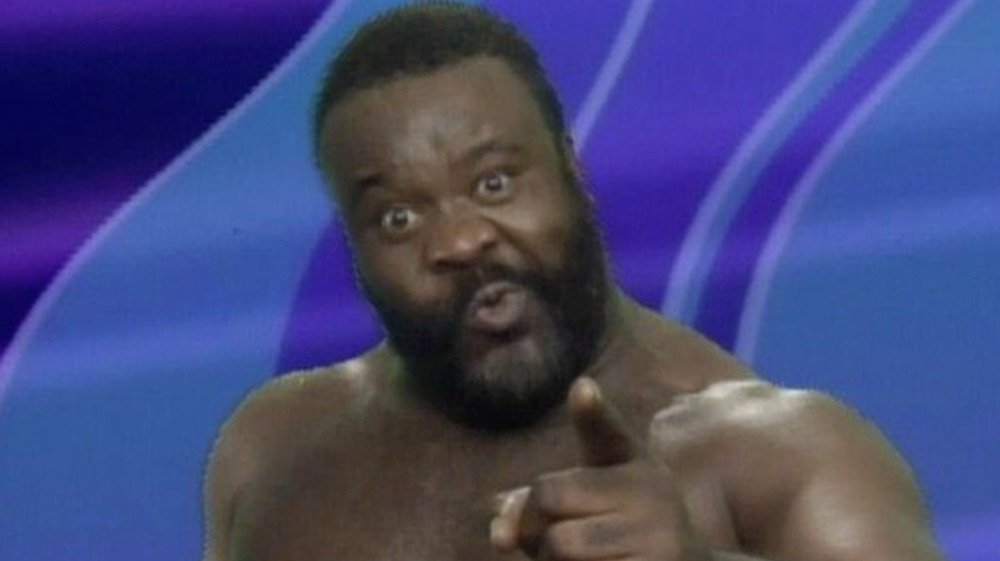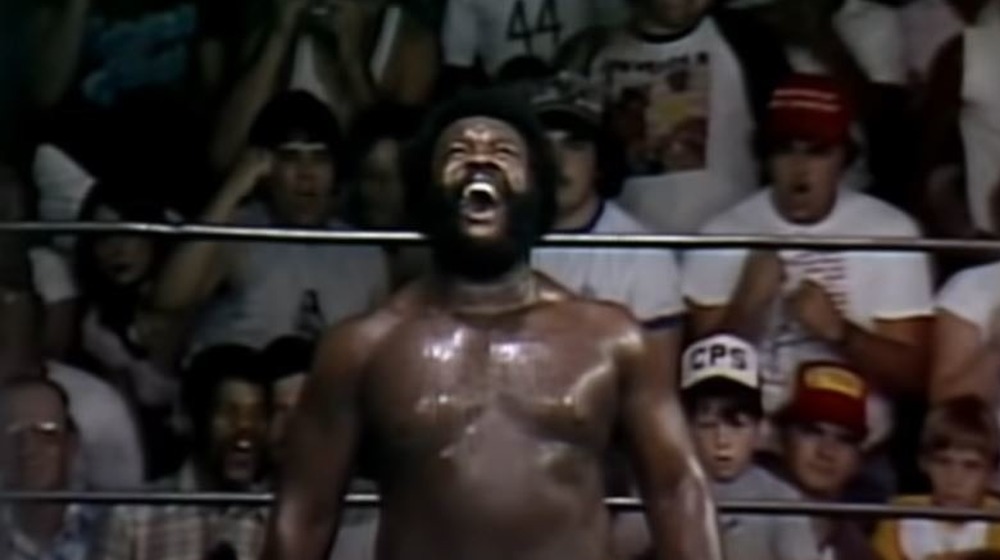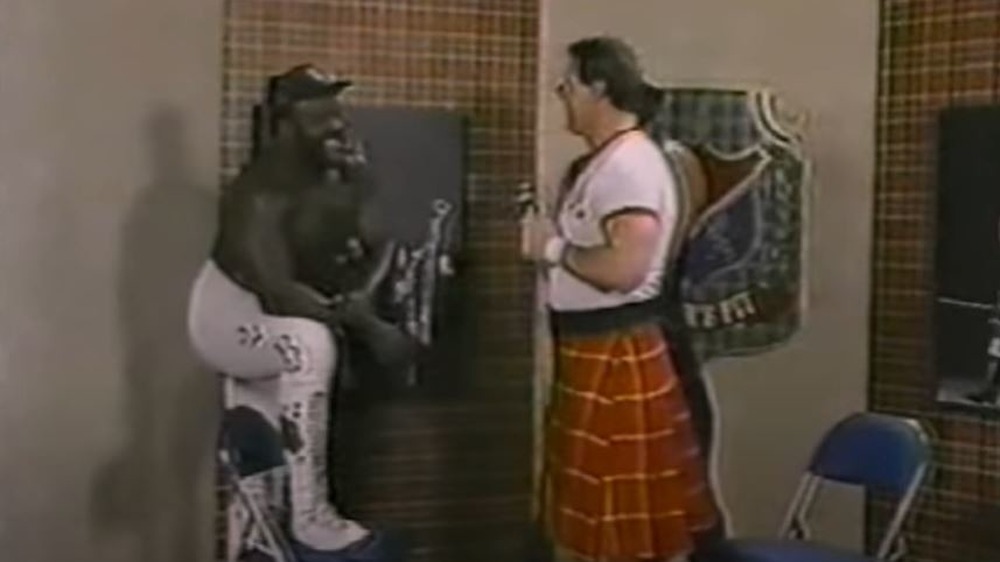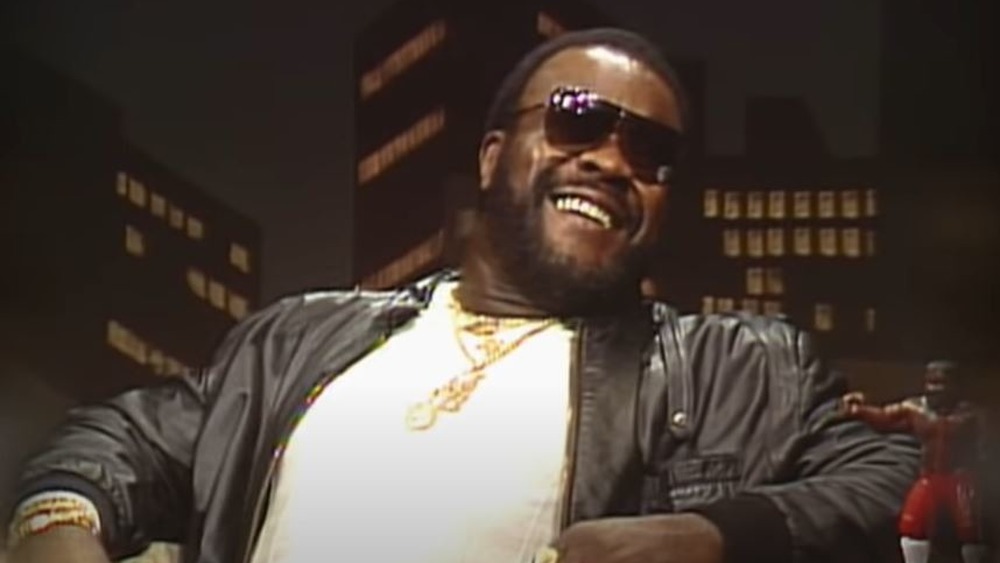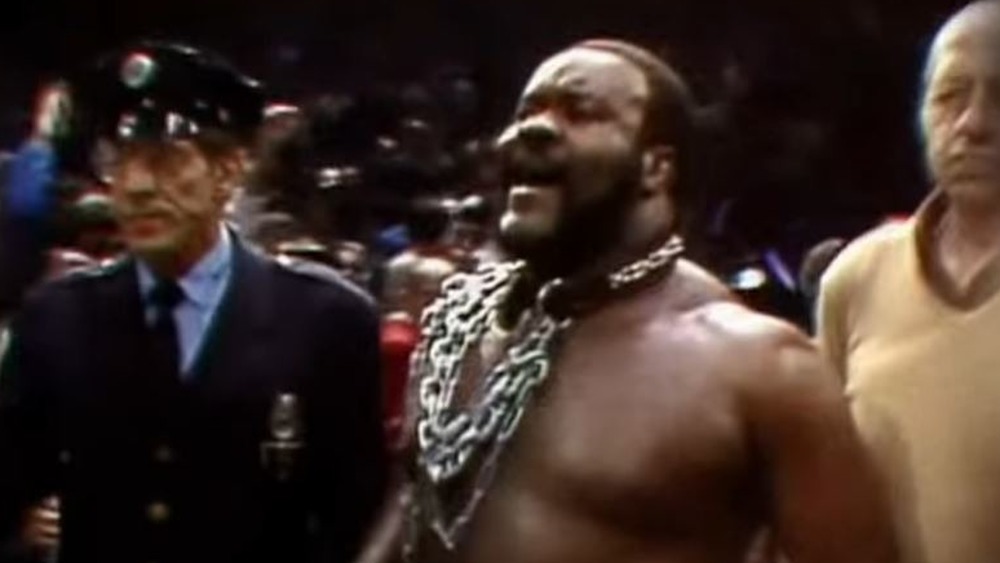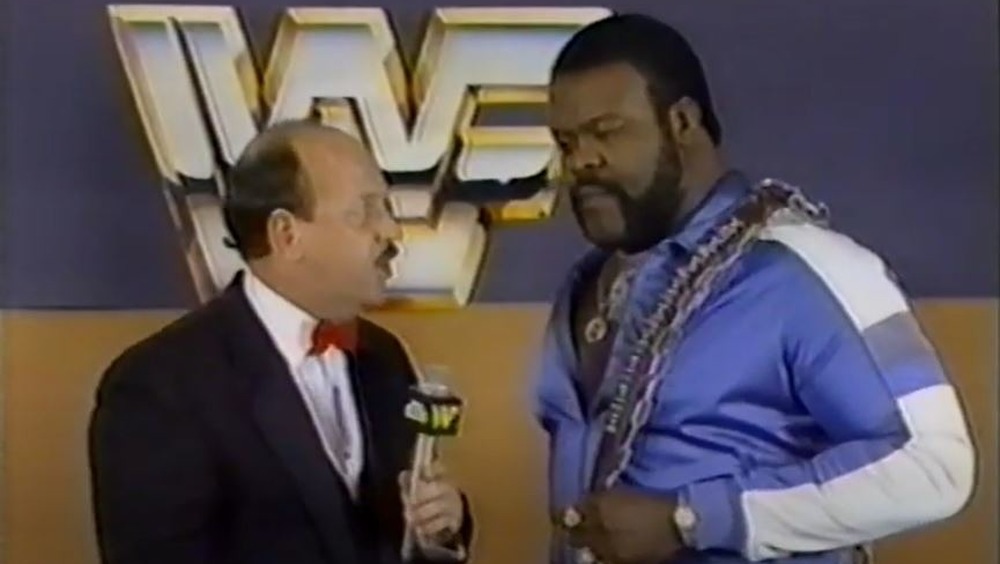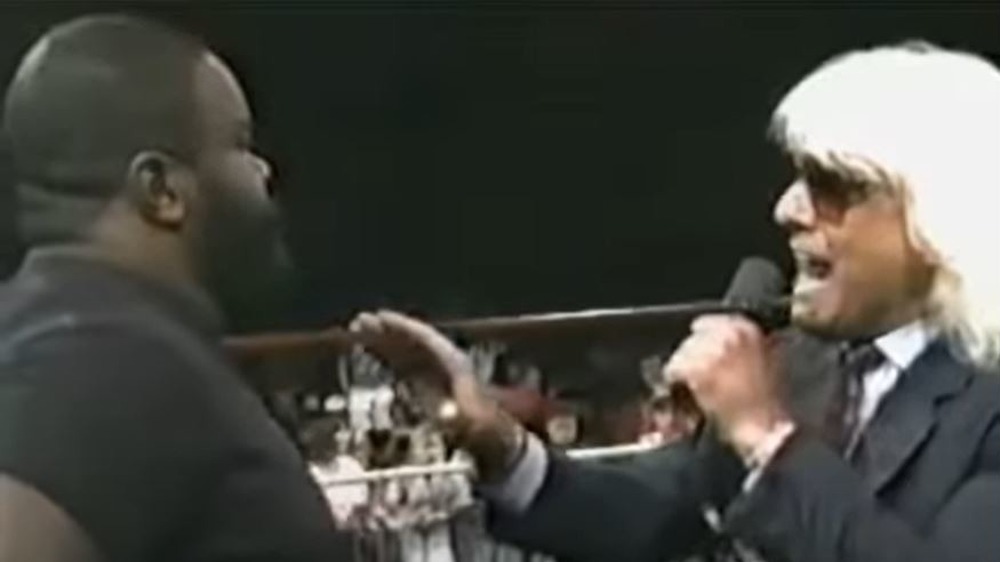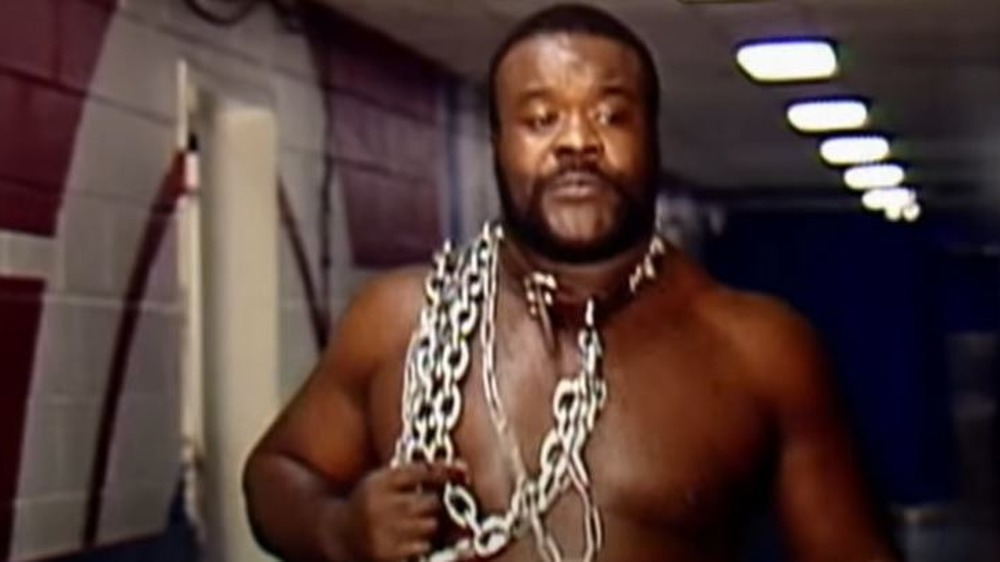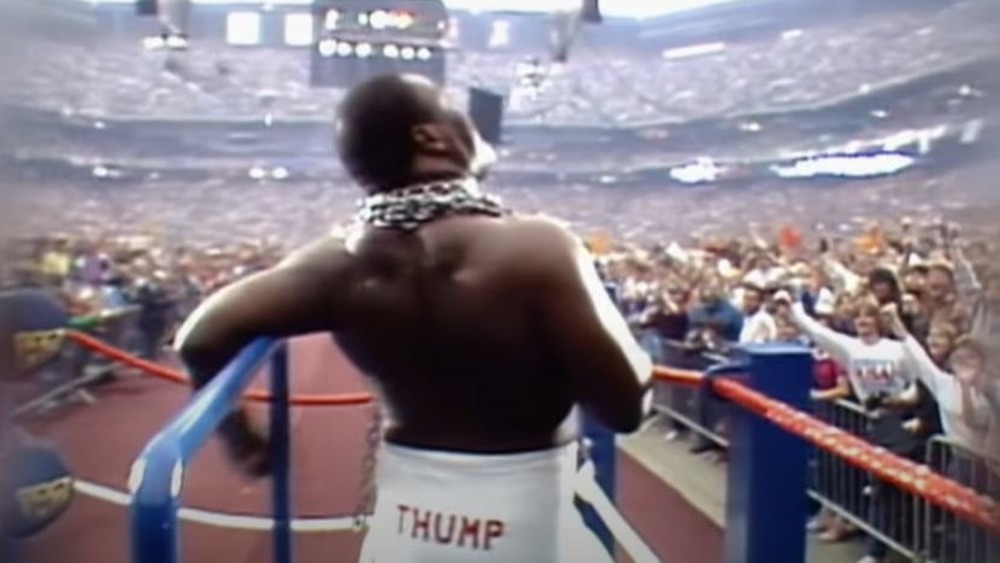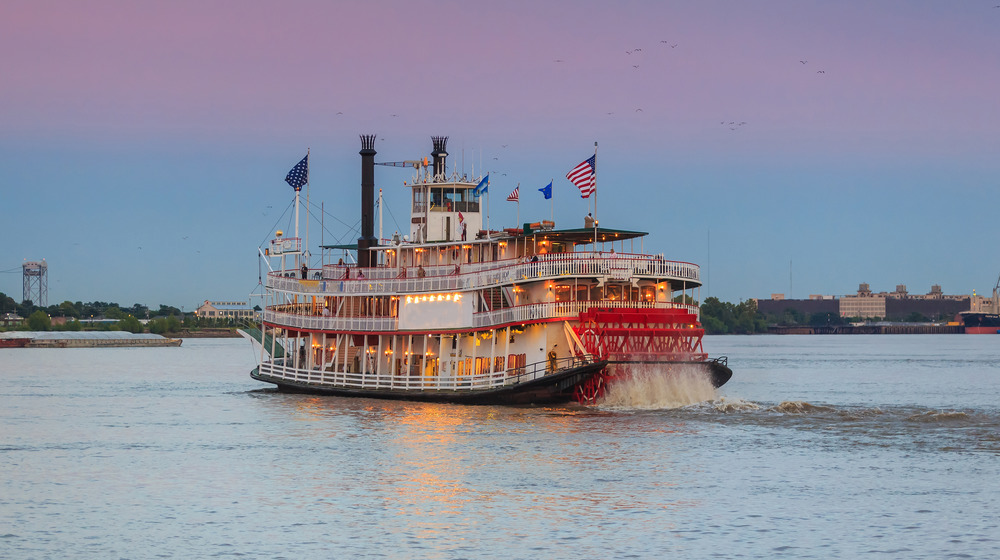Tragic Details About Junkyard Dog
"WHO DAT? WHO DAT?"
Junkyard Dog is often considered the first Black superstar in wrestling. With unmatched charisma and an exciting moveset, JYD was the biggest star in the Mid-South wrestling territories during the '70s and early '80s. His rivalry with the Fabulous Freebirds is still the stuff of wrestling legend. Then he went on to WWF, where he reached wider recognition, even if it wasn't the top of the card. He's enough of a legend that he's in the WWE Hall of Fame.
Even so, as with many wrestlers, there was a lot of tragedy behind his smile. He was a private man, so we only have glimpses into certain aspects of his life. We know he was divorced at the time of his death, for example, but we have few details about his marriages or why they ended. Other parts we have far, far too much documentation about. Here are some tragic details about Junkyard Dog.
He failed as a football player
Football is one of the most common athletic backgrounds for wrestlers. Many of wrestling's biggest stars — including The Rock, Roman Reigns, and Goldberg — played college ball and spent some time at the pro level. Back when Junkyard Dog was just Sylvester Ritter, he was among this fraternity. He was a star offensive lineman at Anson County High School in North Carolina and continued his success at Fayetteville State. He then tried to continue his career in the pros.
JYD is often erroneously listed as a Green Bay Packers draft pick, but that's false on two counts. First, he was never drafted. Much as the Wrestling Observer Newsletter would like you to believe he was picked in the 12th round of the 1975 draft, the name "Sylvester Ritter" doesn't show up in any draft, especially not from 1975. Second, the Packers were the second team he was attached to; he started his pro career with a tryout for the Houston Oilers in the summer of '75.
After not making the Oilers, he returned home and played for the Ohio Valley Panthers of the Carolina Professional Football League. In April 1976, Ritter was signed as a free agent by the Green Bay Packers. During an off-season camp, Ritter suffered an injury. He was cut before the season started, never even having a chance to work out with the team. That injury spelled the end of his football career. Luckily, he had another career waiting for him that brought him greater renown being a lineman ever would.
He experienced lots of racism
Junkyard Dog is often considered the first Black superstar in wrestling. As is always the case when someone is the first Black anything in America, this came with a lot of racism pointed his way. It's worth acknowledging that it was A Different Time, and that racism was often a driving factor in getting people in the door. A heel wrestler might make racist statements towards a face or the crowd for the sole purpose of filling an arena with viewers who wanted to see said heel wrestler get his comeuppance.
Junkyard Dog's feud with the Fabulous Freebirds may well have gone beyond the normal scope of feigned wrestling narratives. Wrestling historian David Shoemaker says the lily-white Michael "P.S." Hayes believed that Black wrestlers didn't need gimmicks because Black was their gimmick, and was known to freely using the N-word. He often called JYD "boy." Heel color commentator Jesse "The Body" Ventura was particularly vicious. Yes, he was playing a bad guy, but he also said that JYD spoke like he had "a mouthful of grits" and referred to aspects of his in-ring performance as "a lot of shuckin' and jivin'."
He had to deal with a crazed fan
Kayfabe was still a key part of the business during Junkyard Dog's heyday, which meant getting involved in some scary situations. Many heels of the era have stories about being threatened, chased, and attacked by fans — stories they often wear with pride, since having them means they were doing their job. Since JYD largely played a face, little ire was directed his way, but on at least one occasion, he had to deal with a fervent fan with a weapon.
One of JYD's hottest angles was his rivalry with the Fabulous Freebirds. In the most infamous moment, the Freebirds blinded JYD with hair cream, with JYD claiming that he'd never be able to wrestle again or see the face of his newborn daughter. Some fans expressed sympathy by sending money to the promotion addressed to Junkyard Dog. Others took more direct action. At some point during this feud, a fan jumped the barricade during a show, pointed a gun at the Freebirds, and threatened to shoot them. Thankfully, arena security broke this up before anyone got hurt.
He was a heavy drug user
Many wrestlers, especially wrestlers who peaked in the 80s, were heavy drug users. Junkyard Dog was no different, and his drug of choice was cocaine. The Iron Sheik claimed to Maxim that JYD introduced him to crack, saying "He my friend. But he no perfect." Junkyard Dog's drug habits were known by both his fellow wrestlers — some of whom may have had to work with a coked-out JYD in the ring — and promoter Bill Watts. Even so, few could sell out an arena like JYD.
While WWF/WWE fans likely didn't know about JYD's predilections until years later, the man's drug habits weren't much of a secret among fans in New Orleans. It was a much smaller community of fans and wrestlers, many of whom were aware of JYD's regular visits to the projects to meet drug dealers.
He was stuck in the WWF midcard
It's often said that wrestlers who win championships have "reached the mountaintop." It's an apt metaphor, not just because it's an accomplishment but because there's not much room at the top. In any given era in any given company, only a handful of people are in the title picture at any given time. This is especially true in the WWF/WWE, where booking has more to do with how Vince McMahon is feeling that day than anything else. This was a ceiling Junkyard Dog faced in New York. He may have drawn crowds to the Superdome in NOLA, but he was just another guy up north.
JYD's four-year run in New York lined up almost exactly with Hulk Hogan's historic four-year stint as WWF Champion. The Intercontinental Championship scene (which JYD got a crack at during the first WrestleMania) was made up of technically sound wrestlers like Randy Savage, Tito Santana, and Ricky Steamboat. Without Vince McMahon's backing for the Big Gold Belt or the in-ring skills for other titles, JYD spent his four years as a midcarder. That's not to say he was unpopular — he got great crowd reactions and fans loved him — but the company never allowed him to reach the heights he did in Mid-South.
His cocaine use led to weight gain
Junkyard Dog's cocaine use had many nasty side effects, but there was one he couldn't hide: his weight gain. He used to be known for his great physique, but by the mid-1980s, he ballooned. Commentators would often try to cover for it, saying that JYD was taking on weight because he was facing off against bulkier opponents like the One Man Gang.
No amount of commentary, gimmick tweaks, or territory changes could cover this one up, though. Some wrestling magazines and newsletters took to calling him "Junk Food Dog." It's hard not to think this contributed to his ceiling in the WWF, where McMahon has always shown a preference for tall, sculpted men over smaller or even slightly pudgier guys. In fairness, it's hard to be seen as a world conqueror if most people only know you as a rotund goof who dances with children.
He was washed up at age 35
Most wrestlers are in their prime at age 35. They're at their physical peak, with enough experience and respect that they can practically book their own space on the card. Not so Junkyard Dog. When he was axed from WWF in 1988 as a cost-cutting measure, his time anywhere near the main event scene anywhere in America was done.
Not long after he was cut, he joined the NWA — which soon became WCW — where he was given a main event run in 1990. This included an extended feud with Ric Flair that was so poorly received the Wrestling Observer Newsletter dubbed it the Worst Feud of the Year. JYD would spend the next few years getting cut by WCW and rejoining them, largely due to his conditioning and low drawing power.
He spent the last few years of his life touring the indie circuit, a shell of his former self doing gimmick matches with fellow legacy acts during what should have been his best earning years. Even so, he was clearly enjoying himself, as an International Wrestling Federation promoter told the Morning Call: "He enjoyed it all, the big crowds, (the) small. It didn't make any difference as long as he was around to sign autographs and take Polaroids with the kids. Every kid he met, he'd say, 'Are you still in school? Stay there baby, do it.'" He also worked as a repo man to make ends meet.
He died relatively young
On June 2, 1998, Junkyard Dog — very much Sylvester Ritter at this precise moment — was driving home to Magee, Mississippi, from his daughter's high school graduation in Wadesboro, North Carolina, when he lost control of his vehicle. The car rolled over three times and he died in the crash, which occurred near Forest, Mississippi. It's unknown why or how he lost control, though some reports indicate that he fell asleep at the wheel.
Promoter Guy Walters relayed to the Morning Call that Ritter specifically asked for graduation weekend off, saying, "If that's the last thing in the world I do, I'm not going to miss it." Grimly prescient words, but at least he lived to see it just like he wanted. Junkyard Dog was 45 years old at the time of his death, and condolences poured in from the sports world. He was buried in his native North Carolina.
His only daughter Latoya also died young
Junkyard Dog's death wasn't the end of tragedy in his family. On Oct. 19, 2011, Latoya Ritter, his only daughter, was walking down the stairs in her home and talking on the phone when she abruptly fell and died. She was just 31. The tragedy for the Ritter family was made worse by the fact that she was a perfectly healthy young woman.
Several years later, wrestling website Pro Wrestling Stories published a Junkyard Dog retrospective. It mentioned Latoya's death and how there had been no word on the cause. A friend of the Ritter family reached out and provided clarity: "I just wanted to pass on that Latoya died of a heart attack. Doctors said she was gone before she hit the floor. As tragic as her loss is, there's consolation in the knowledge that she didn't suffer."
He's nowhere near as popular in his native New Orleans as he once was
Junkyard Dog's popularity at his peak isn't just inflation of wrestling lore; it's empirical fact. Around 1981-1982, New Orleans school children were polled about which local athlete they'd most like to meet. This was at the tail end of Archie Manning's nearly decade-long run as Saints quarterback, and LSU scoring legend and New Orleans Jazz guard "Pistol" Pete Maravich had just retired, but JYD still overwhelmingly won the poll. He was also a proven draw, with at least one estimate showing he drew a million fans to the Downtown Municipal Auditorium over five years.
Recently, however, Junkyard Dog's name doesn't carry the weight it used to around New Orleans. Writer Greg Klein, author of The King of New Orleans: How the Junkyard Dog Became Professional Wrestling's First Black Superhero, explained why to Antigravity Magazine: "It's wrestling, a form of entertainment that is disdained by the traditional media. It is also a form of entertainment that has never had much in terms of history, in terms of celebrating its own history. The WWE owns the likeness rights, so you can't just go market the Junkyard Dog. They don't do much with their rights either, so nothing is out there. Add in the race part, add in the 30 plus years, add in the uniqueness of New Orleans culture that people often don't get... mix it all together. It's like a gumbo. Not everyone likes it. Not everyone gets it." Klein has gone so far as to push for a statue of JYD in Louis Armstrong Park.
Wrestling fans from the territory days are a dying breed. Junkyard Dog was dead when the Attitude Era kicked into high gear, so at least two generations of fans never even saw him wrestle live. Most fans who do remember him still think of him as the guy who sang "Grab Them Cakes" on the Wrestling Album. At the very least, he was posthumously inducted into the WWE Hall of Fame in 2004.
